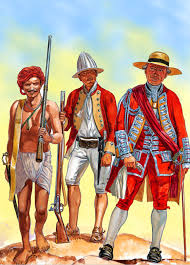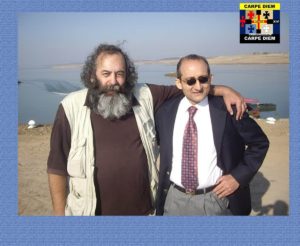From Dr Hamid Hussain. Some random notes about the first generation of Indians to become officers in the British Indian army, this note includes interesting tidbits about the handling of religion, class and caste issues in the Indian army in those times.
Pakistani general perception that somehow British favored non-Muslims as far as army was concerned is incorrect: In view of anti-British attitude of Hindu dominated Congress, British had more sympathetic view of Muslims. Congress had refused to endorse war effort while Muslim League wholeheartedly supported war effort.
British support applied to all classes of Muslims; including politicians (many Muslim League leaders would meet regularly with Deputy Commissioners to get directions), British senior civil servants giving instructions directly to Muslim junior Indian Civil Service (ICS) officers regarding law and order bypassing senior Hindu ICS officers fearing that later may pass on information to Congress (Police especially CID files of that time period are a very interesting read in this regard). Same was true for army officers. Many senior officers especially Auk helped to push many Muslim officers. Ayub Khan (1 Assam Reg.), Sher Ali Khan Pataudi (1/1 Punjab) and Habibullah Khan Khattak (I Bihar Reg.) were given battalion commands during the war by direct intervention of Auk.
The issue of DSO has another angle. It is usually given to the rank of Lt. Colonel and above. A lucky major may bag it if really good. Very few Indian officers were at Lt. Colonel rank during the war and those commanding battalions in combat theatres were very few. Non-Muslim officers being senior got appointments and hence got the opportunity to get awards. Many pioneer Muslim officers had left the army early for more prestigious Indian Political Service (IPS) and the list include Sahabzada Khurshid, Sikandar Mirza, ABS Shah, MAO Beg etc. If they had stayed in the army, they would have been senior enough to get battalion commands and hence a shot at gallantry awards in combat.
Most Muslim officers were Captains. I don’t have the whole list but I think disproportionately more Muslim officers got Military Cross (MC); an award for which they were eligible.
I agree with you that maintaining loyalty of Indian officers was crucial during the war especially in view of nationalist campaign by Congress with large scale protests as well as emergence of Indian National Army (INA) from Indian POWs in Japanese POW camps. Many benefits such as equal pay, important postings and possibly more liberal gallantry awards were part of this effort.
We need not to forget the attitude of Indian officers; both Muslim & non-Muslim. Almost all Indian officers had deep antipathy towards politicians and saw them as rabble rousers. Overwhelming majority considered INA as cowards who broke their oath while in captivity and accused them of taking an easy way out of a harsh imprisonment. This attitude was maintained right up to the eve of independence in August 1947. All officers were against the division of Indian army. To understand this phenomenon, we need to look beyond the post-independence revisionist statements of some officers i.e. LG B.M. Kaul, General Ayub Khan, MG Sher Ali Khan Pataudi, MG Tajjammul Hussain. We need to look at the files of that time period and actual statements of officers that are very well preserved in archives.
A small number of ambitious officers tried to hob nob with politicians at the very near end when they saw that British were going. I’ll put B Kaul and JN Chaudhuri of India in this category. MG Akbar Khan of 1951 conspiracy fame of Pakistan army was also ambitious but made the mistake of opening his mouth in front of Jinnah. He complained that they hoped to get rapid promotions but in view of Jinnah’s decision to keep senior British officers, this process will be delayed. Jinnah promptly rebuked him.
Racial & Class Bias: In general, British conquered India and naturally like any dominant group had no high regard for anything Indian. They saw their own culture, religion and society superior. In Victorian era, British army officers were exclusively from aristocracy. Purchase of commission meant that only affluent could afford an officer commission. Commoners were only to serve in the ranks and hope to become Sergeant as the ultimate professional ceiling. If a British aristocrat officer was not allowing even a British commoner to enter the elite officer club, how he could allow an Indian? After First World War, changes in English and Indian societies opened new avenues. British encouraged traditional Indian elites including landlords, members of civil service, police and army to educate their children so that they could qualify for commission. These classes were in service of the government for a long time and in return prospered under Imperial patronage. Members of these classes joining army as officers ensured continued loyalty of the Indian officer corps. This also diminished chances of subversion by newly emerging nationalist politics.
The bias was not simply a one way street between English and Indians. Both English and Indian societies were riddled with social and class distinctions and outright bigotry. An English aristocrat had nothing in common with a peasant from highlands. Similarly, Hindu Rajput would not allow a low caste Hindu to touch his food. A Pathan Muslim had no affinity nor respect for a Bengali Muslim. The problem went all the way down even in small and distinct communities. Two examples will suffice; High caste Jat Sikhs would not serve in a regiment with non-Jat Sikhs (Lobanas) let alone low caste Mazhabi & Ramdasia Sikhs. Hence these different groups of Sikhs were recruited in different regiments. Dogras were Hindus but Rajput and Brahman Dogras would not eat together. 5th Probyn Horse traditionally had Dogra Rajput squadron.In Second World war, due to increased manpower needs that could not be met from traditional classes, Dogra Brahmans were recruited. This added to administrative headache as in Probyn’s Horse instead of squadron mess for a single class, troop messing had to be implemented as Brahman Dogra would not eat with Rajput Dogra. It is no mean achievement that a first class army was created despite these administrative nightmares.
In 1932, it was decided to start an Indian Military Academy to train officers in India and in December 1932, first batch of 40 cadets started their training. The first batches of Indian Commissioned Officers (ICOs) faced discrimination even from fellow Indian officers who attended Sandhurst and known as King Commissioned Indian Officers (KCIOs). In 1934, when two Sikh ICOs joined 3rd Cavalry there was a debate whether they should be allowed to eat in the mess. 3rd Cavalry was Indianized in 1932 and several KCIOs (Iftikhar Khan, Shahid Hamid, K. P. Dhargalkar, P. C. Banerjee, P. S. Nair, K. K. Varma and Nawabzada Agha Raza) were already serving in the regiment.
On the other end of the spectrum, the world of officer corps was opened to the least educated and very conservative class of India. One example will show the enormous adjustment problem for both the Indian officers and their spouses of this class. Gurbaksh Singh Dhillon enlisted as soldier and spent three years in an infantry battalion (4/14 Punjab Regiment). Light machine gun section of infantry battalions had mules for transport and every soldier was rotated to take care of the mules. Gurbaksh on his turn also performed this duty while his wife Basant helped him in polishing the mule saddle. Gurbaksh qualified for Dehra Dun and after successfully completing his training was commissioned as an officer in 1/14 Punjab Regiment. One can easily imagine the psychological barrier that Gurbaksh and his wife had to cross as the worlds of sepoy and officer were poles apart. Even an Indian officer of aristocratic background (LG Sahabzada Yaqub Khan, MG Sher Ali Khan Pataudi) or highly educated (General JN Chaudhri and LG Atiq ur Rahman were educated in England) would have found it very difficult to see Gurbaksh as brother officer. There is plenty of evidence that many Indian KCIOs from Sandhurst didn’t consider fellow Indian officers from Dehra Dun as equal. They called them ‘Dun Pansies’. Some Indian officers completely identified with British ethos and were called ‘Brindians’. General JN Chaudhri when instructor at Staff College Quetta deliberately kept away from Indian officers and only interacted with British officers. This attitude reached to a point where all other Indian officers at staff college rebuked him with social boycott. MG Iftikhar Khan ‘Ifti’ was also a ‘Brindian’.
This lingered on even after independence in India and Pakistan. In early 1950s, ‘martial class’ senior Indian officers (Rajput & Sikh) used to whisper that Indian army would not accept a ‘dhoti parshad’ to be appointed army chief using a derogatory term for Hindu non-martial races. In Pakistan army, contempt was shown for Bengalis and General Ayub Khan refused to expand Bengali recruitment stating that he could not take risk with classes who have not been tried in combat.
There was another problem with second generation of officers. Officers whose fathers were commissioned officers vs those whose fathers were VCOs belonged to two different social classes. Former were educated in missionary schools in line with English public school system, had good command of English, brought up in cities and their female family members educated and outgoing. Later, mainly from rural and conservative backgrounds, educated at village schools or special schools set up for sons of VCOs (King George Military Colleges), less command of English language and females mainly in ‘purdah’ and generally not educated.
Surprisingly, combat experience of Second World War where young British and Indian officers fought together broke many barriers. Professional conduct and acts of bravery of young Indian officers showed to British colleagues that Indians were no inferior in the profession of arms. On the other hand, urban educated British youth raised in more liberal environment were not of the same old ‘Imperial mold’. The color bar of clubs in India was broken by some of these British officers. They refused membership of clubs that would not allow Indian officers and some cavalry regiments refused to lend their horses to such clubs for equestarian activities. This comradeship is born by the fact that decades after independence, these officers kept in touch with each other attending regimental re-unions.
Subedar Major Prabhat Chand Katoch: He won his MC in 1914 in France. When all British officers of the battalion became casualty, he took over the command of the battalion.
6/13 FFR suffered heavy casualties in Great War in western theatre and probably highest number of casualty rate as far as British officers are concerned. Battalion landed in France with 13 British officers, 18 Indian officers and 810 other ranks. A year later, no British officers, 4 Indian officers and 75 ORs remained of the original contingent. Ten British officers were killed including their CO Lt. Colonel P. C. Elliott-Lockhart; originally from Guides and 19 wounded. The only officer not wounded was Captain Inskip who was shell shocked and not present. Subedar Major Prabhat Chand of 6/13th FFR was the first Indian who was awarded Military Cross (MC) for his conduct and battalion command when all British officers became casualty. Battalion used to have a tradition where Subedar Major would parade off the battalion on ceremonial occasions remembering Prabhat Chand’s bravery.
Three brothers had illustrious career (see picture below). Prabhat’s valor already known. Col Bakshi Chand Katoch was awarded an IDSM in Mesopotamia when he was the Subedar Major of the 56th FFR. He was subsequently commissioned with the first batch of KCIOs from the Cadet College, Indore in Dec 1919. Honorary Captain Bidhi Chand was Subedar Major of 38thDogra; a post I think he held for 18 years.
 Another BP Podcast is up. You can listen on
Another BP Podcast is up. You can listen on 